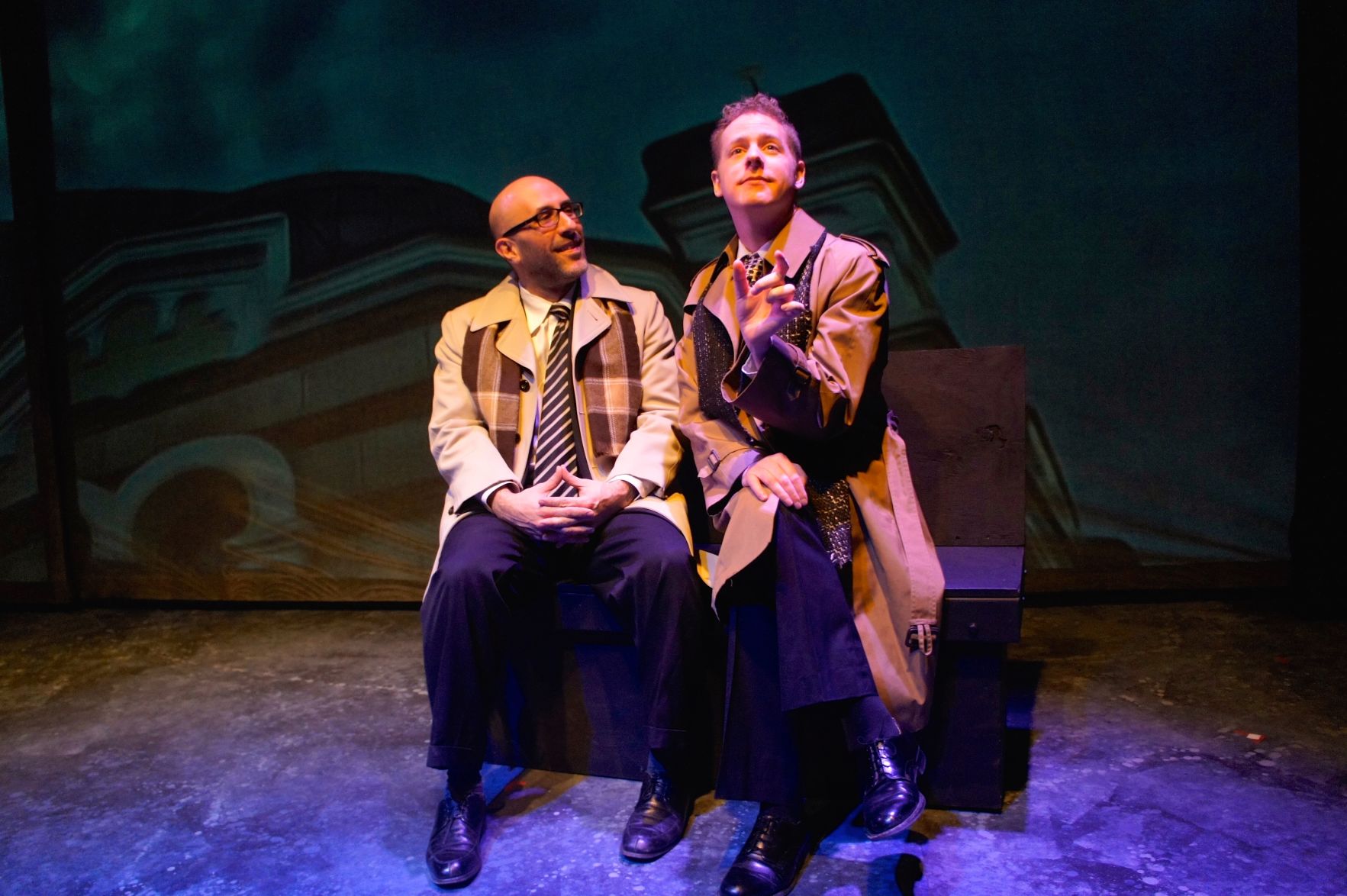none too fragile’s ‘The Whale’ wallows in well-chartered waters
By Bob Abelman
In Samuel D. Hunter’s “The Whale” – initially found breaching off-Broadway in 2013 and currently on stage at none too fragile – Charlie’s death scene clocks in at 1-hour and 50-minutes.
For the entirety of this slow-moving but quietly affecting drama, the morbidly self-destructive, always-apologetic 600 pound Charlie sits on or precariously orbits around his couch in a small northern Idaho apartment awaiting his final, thin exhale.
Intermittently orbiting around Charlie (Robert Ellis), when he is not offering online tutoring on expository writing, are a handful of well-intended characters who are remarkably ill-equipped to follow through with their objectives.
There’s his devoted caretaker and only friend, Liz (played by a wonderfully intense Jen Klika). She is forever insisting that Charlie go to the hospital to control his death by overeating but never manages to get him there. Her visits are as much a lifeline for her as they are for him.
There’s his estranged teenage daughter Ellie (portrayed with intelligence and impenetrable goth gravitas by Ireland Derry), who hates everything and always chooses the path of most resistance. She is repulsed by Charlie’s appearance, his life choices and his helplessness, but stays by his side nonetheless. Good-hearted despite having congestive heart failure, Charlie finds wonder in her wrath, beauty in her bile, and evidence of good intentions in her bad behavior despite his ex-wife’s insistence that there are none.
A victim of Ellie’s passive-aggressive do-gooding is Elder Thomas (the delightful Jon Heus), a naïve young Mormon missionary who arrives at Charlie’s door to offer spiritual guidance but leaves an inadvertent recipient.
Also paying a visit is the ex-wife Mary (a poignant Rose Gabriele), whose resentment over Charlie leaving her for another man has softened over the years into an awkward, alcohol-assisted affection.
Hunter’s play serves up moments that are wonderfully surprising in what they reveal about these characters and in their tender rendering. But, between those moments, “The Whale” lies beached in familiar territory about mending relationships and seeking redemption.
And the play’s modus operandi – its marginalized Idaho-bounded inhabitants, its many short scenes that create the rhythm of time passing painstakingly, and its disgraced religious zealot and emotionally damaged teenager – is pilfered from the playwright’s own “A Bright New Boise.”
Clearly, the novelty of the protagonist’s size and the untimely death of his partner, Alan, are intended to offer commentary on how those of us with sensitive souls and big hearts are easily victimized, beaten down and broken by others. And the play’s numerous references to Herman Melville’s “Moby-Dick” – Charlie’s favorite novel – run parallel with the damage and anger this whale of a man has inadvertently caused in those around him.
The codependent caretaker, the rebellious daughter, the fallen Mormon, and the alcoholic ex-wife are Ahabs all.
And yet, all the intended metaphoric meaning seems a bit too forced and, at times, too transparent to carry much weight.
It is fortunate that director Sean Derry’s finds all the small and often subtle bits of dark humor in the script that helps make these characters relatable and adds life to the death knell that drives this drama. And he has pulled together exquisite actors who deliver this humor as if it was a natural extension of their characters’ anguish.
Authenticity is key at none too fragile, where the staging is so intimate that the first row of seats invades the fourth wall. Any false pretense in the performances or in Derry’s simple set design is easily spied. There is none of that here.
Ellis’ performance is particularly authentic. His Charlie is a gentle and self-effacing giant, yet the deep psychological crisis that gnaws at him, the emotional pleasure and pain he suffers with each visit by Ellie, and the immense physical discomfort that accompanies his every movement is always visible.
Ellis’ feigned strain under the illusion of massive weight created by a plausible fat suit designed by Jackie Guerra is remarkable. It seems so real that one fears that the performer expires at the end of the production and not just the character he plays.
Come to none too fragile to see an engaging if unexceptional work by MacArthur Foundation genius grant winner Samuel D. Hunter. Stay to marvel at the eloquent performances it is provided.
On Stage
WHAT: “The Whale”
WHERE: none too fragile, 1835 Merriman Rd., Akron
WHEN: Through Feb. 18
TICKETS & INFO: $25, visit nonetoofragile.com
Bob Abelman covers theater and cultural arts for the Cleveland Jewish News. Follow Bob at Facebook.com/BobAbelman3.
Originally published in the Cleveland Jewish News on Feb. 5, 2017.
Lead image: Rose Gabriele as Mary and Robert Ellis as Charlie. Photo | Brian Kenneth Armour











